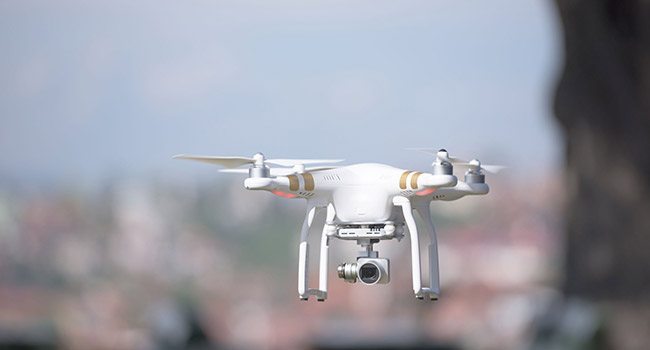It’s no secret that Arizona has the best weather in the nation and our sunny skies play a large role in the success of our aerospace industry.
Arizona boasts more than 300 days of “clear sky weather” a year, making our state an ideal location for larger aerospace and defense companies and has contributed to the success of our unmanned aerial vehicle (UAV) industry.
UAVs, or drones, have historically been used for unmanned flight in military operations, but they have become increasingly useful for commercial applications. Drone payload (and the sensors and equipment attached) are revolutionizing the way that data is captured in commercial building inspections. They are a safer alternative to traditional inspection methods, providing a more comprehensive analysis. But, when hiring a drone pilot, verify that they are working under the Federal Aviation Administration (FAA) Section 333 Exemption and that they are insured.
The FAA is the final word in all flight regulations, for both traditional pilots and UAVs. Following the 2016 Part 107 waiver ruling (14 C.F.R. Part 107) the use of drones both recreationally and commercially has increased rapidly. With increased usage, clear regulation is needed. State and local governments nation-wide have struggled to keep up on the legislative aspects of the industry.
The FAA issued the first ruling in the U.S. addressing the rights of states and municipalities to regulate drones this September in Massachusetts. This landmark ruling states that the City of Newton, Mass. did not have the authority to impose its proposed ban on UAV flights below 400 feet, over public or private property without the landowner’s permission, or require local registration of drones. The City of Newton passed the law, but the FAA struck it down.
In the absence of guidance from the FAA on specific legislation needed for this technology, states and municipalities have begun to create their own laws and ordinances, which can become confusing and difficult to navigate.
For Arizonans, this is not the case. Governor Doug Ducey signed legislation in May of 2016, barring cities and towns from making their own rules legislating drones.
“The drone community, from manufacturers to hobbyists to large commercial users, banded together in late 2015 to combat a dizzying array of local government proposals to regulate the use of drones within their borders,” said Cheyenne Walsh, a lawyer whose practice focuses on government affairs at the Arizona State Capitol. “The patchwork of proposed limitations would have stifled the fledgling industry in Arizona, and prevented any chance of Arizona maintaining its reputation as a place for innovation to flourish, particularly in the aerospace industry. It quickly became clear that a statewide solution was necessary, and the coalition was able to work with Senator John Kavanagh, R-Fountain Hills, to ensure minimal regulation of unmanned aircraft going forward in Arizona.”
This November, experts in the field of unmanned aerial systems will present at Arizona’s UAS Summit & Expo., held at the Sheraton Wrigleyville in Mesa, which will feature a presentation on the national mood and trajectory of UAS from Brian Wynne, President of the Association of Unmanned Vehicles Systems International.
Mignonne Hollis is the executive director of Arizona Regional Economic Development Foundation, which founded the Aerospace Arizona Association in 2015.




